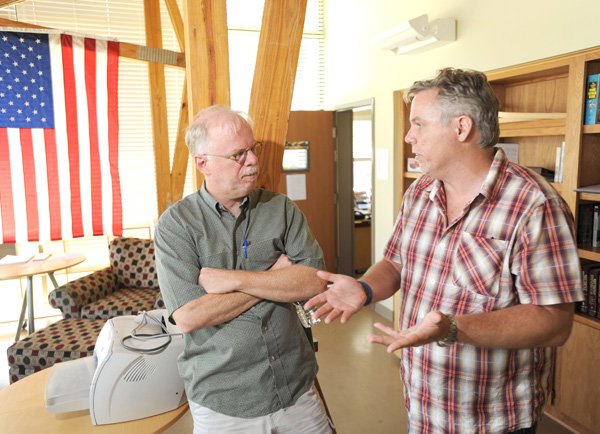FAYETTEVILLE — A nationally known advocate says Americans communities have a choice about dealing with people who are homeless.
“They can embrace homelessness or they can try to bulldoze it,” said Mark Horvarth, founder of the website InvisiblePeople.tv.
WEB WATCH
Mark Horvarth’s Blog
http://invisiblepeople.tv
---
The Cobblestone Project
www.cobblestoneproject.org
---
University Of Arkansas Community And Family Institute
http://sociology.uark.edu/1876.htm
Horvarth came to Fayetteville on Friday for a weekend of activities designed to bring attention to homelessness in the region. He said he hopes to motivate people to get involved to improve their situation and prevent future homelessness.
He will appear at 6 p.m. today at the University of Arkansas Global Campus at an event sponsored by the Cobblestone Project and the Community and Family Institute.
A panel discussion on ways to end homelessness will follow featuring local homeless people and representatives from Seven Hills Homeless Center, the Northwest Arkansas Women’s Shelter and the Samaritan Community Center.
Horvath, a former television producer who lost his job and ended up homeless on Hollywood Boulevard, now travels the country filming interviews with homeless people and posts them on the Internet.
“I give a voice to homelessness by giving them the medium. They’re telling their stories. These are raw, unedited, whatever they say goes out,” Horvath said. “In reality, we’re all so busy or too scared to roll down our window to talk to that guy at the exit ramp, but we’re curious, what’s their story?”
A 2009 survey of those who are homeless determined the region has at least 1,287 people who fit that description.
Horvath said the stereotypical guy with the cardboard sign alongside the street represents only 20 to 30 percent of the homeless population. There’s another side of homelessness that most people don’t see. Horvath tries, through his project, to humanize those who are homeless.
Horvath said that since he was here last year, members of the NorthWest Arkansas Community have chosen to start housing and feeding programs and a farm was donated, so food can be grown to feed the homeless.
“It’s because of the community. It’s not because of me,” Horvath said. “I want to applaud the community here. I wish other communities would rally around it. In other communities, there has been change, but nothing like this.”
It usually takes a tragedy, like a homeless person freezing to death in a park, to motivate a community to act against homelessness, Horvath said.
“But here, it was ‘It’s the right thing to do,’ the compassion,” Horvath said.
Kevin Fitzpatrick, director of the Community and Family Institute in the University of Arkansas’ Sociology Department, and Jon Woodward of Seven Hills, said tonight’s event is important because it keeps the issue visible and because there are still many people who don’t realize the magnitude of the problem.
“What it allows the community to do is refocus, to re-energize and recommit to the problem,” Fitzpatrick said. “Either you choose to engage the community or ignore the problem.”
Sometimes people just need a little push to get involved, Fitzpatrick said. Several hundred people have stepped up since Horvath’s last visit and gotten involved with agencies that assist the homeless.
“Homelessness is not a sexy problem. For many people, it’s sort of uncomfortable,” Fitzpatrick said. “It’s just not one of those problems that’s easy for people to engage, primarily because they just don’t understand it.”

